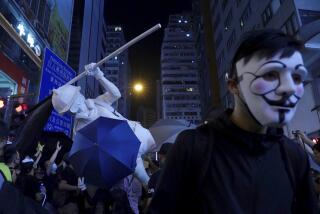Hong Kong Keeps Hands-Off Policy
- Share via
HONG KONG — Securities dealers shuddering at the crackdown on insider trading in New York and London may wish they were in Hong Kong--the world’s third-largest financial center--where offenders face nothing more onerous than public embarrassment.
This could change as the government considers toughening its financial rules to clean up the secretive image of the aggressively capitalist British colony and attract more foreign investment. But don’t bet on it.
When New York arbitrageur Ivan F. Boesky was convicted of insider trading, the court ordered him to pay $100 million in fines and penalties and to wind up his connections with the financial markets.
But when wealthy businessman Li Ka-shing was named in Hong Kong’s biggest insider trading scandal last year, all that happened was that his name appeared in bold headlines on the front pages of Hong Kong newspapers.
Li was rebuffed when he went to court to try to clear his name, claiming that the disclosure had hurt his reputation. But he still is in business, with little indication of damaged prestige or influence.
Tougher civil penalties have been considered by a special committee of government officials and businessmen--formally called the Standing Committee on Company Law Reform--but there is little enthusiasm for making insider dealing a criminal offense.
“Hong Kong has a tradition of being very open, comparatively free-wheeling, where the government doesn’t over-regulate or interfere in businessmen’s affairs,” Financial Secretary Piers Jacobs said in an interview. “This will make criminal sanctions tough to enact.”
Highly Active Sector
Still, the stakes are high because regulators want the colony’s multibillion-dollar securities industry to grow and play a bigger role in international markets.
There also is the specter of the 1997 takeover of Hong Kong by China, which, in the words of one official, punishes what it calls economic crimes with “a bullet in the back of the head.”
Hong Kong’s financial sector is highly active: Daily turnover on the stock exchange here runs about $120 million, and the 260 listed companies boast a total capitalization of about $51 billion. The colony also has 215 investment trusts and funds managing some $20 billion, according to Derek J. M. Murphy, the deputy commissioner for securities.
“This is a dramatic boost over the last five years,” he said. “The industry grew from next to nothing.”
The special committee has reported its findings to Jacobs but has not made them public. Jacobs has said he will also receive recommendations from Hong Kong’s Securities Commission and the Monetary Affairs Branch before making a proposal to the colony’s governor sometime this fall.
There have been suggestions that those associated with insider trading be barred from holding directorships in public companies, Jacobs said, and that ill-gotten profits be required to be returned and heavy penalties imposed.
The key interest is protecting the colony’s image abroad. “It has to be well recognized that in Hong Kong we are taking this seriously,” Jacobs said. “It is a potentially serious situation that could affect the reputation of the market.”
International Pressure
The eventual recommendations are expected to deal not only with insider trading but with public disclosure of business deals, in part to make it more difficult to launder drug money in the colony.
International groups already are pressuring Hong Kong to reform its secretive business practices, which allow banks to maintain “hidden reserves” and directors to buy and sell shares in their own companies without reporting the activity.
Murphy said regulators want to be able to disclose business information to other regulatory authorities and “supranational” regulatory organizations, such as the International Organization for Securities Commissions in Montreal.
Another change being sought would require “substantial shareholders and directors” of public companies to disclose their holdings and dealings in their companies to give ordinary shareholders warning of corporate raids, ensure compliance with Hong Kong’s takeover code and help create a better informed market.
But the fight on this issue will be tough. Opponents argue that Hong Kong Chinese are culturally secretive and that such disclosures would put successful investors at the mercy of kidnapers and blackmailers, and that it would publicly humiliate people who are believed to be successful but who are not really so.
More to Read
Sign up for Essential California
The most important California stories and recommendations in your inbox every morning.
You may occasionally receive promotional content from the Los Angeles Times.










